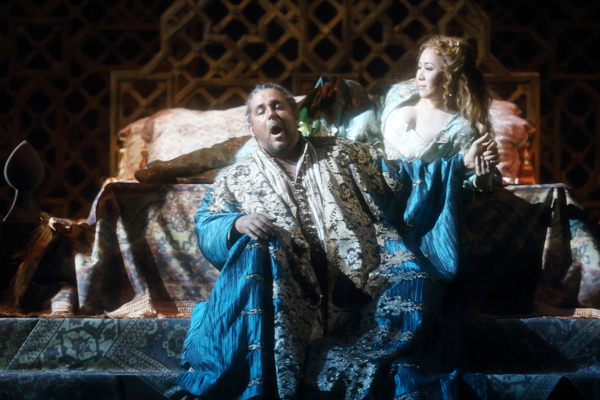 |
|
Giancarlo del Monaco's Otello is a tribute to Verdi's 200th birthday, produced by the National Center for the Performing Arts. Photos Provided to China Daily |
Review | Raymond Zhou
Otello is the first of two new productions the National Center for the Performing Arts is staging in Beijing to commemorate the 200th anniversary of Giuseppe Verdi's birth. Nabucco will be staged in May.
NCPA has enlisted the services of Giancarlo del Monaco, whose Flying Dutchman last year wowed audiences but alienated some critics. He has again delivered a cinematic experience fit for popular sensibilities.
A stormy ocean is projected on a closed curtain, which disappears when the stage proper is lit. A turbulent sea serves as visual interlude to break up set changes and accentuate stage actions, such as the dramatic climax when Otello kills himself next to Desdemona's body and the two are engulfed by raging waters.
But there are also places this overarching motif needs to be adjusted, especially the transition into the bridal chamber duet that closes Act I, which should be amorous instead of choppy.
Del Monaco has a special affinity for Verdi's penultimate opera. His famous father, Mario del Monaco, used to sing the formidable title role.
Tenors who perform admirably in this role are a rare breed. American tenor Frank Porretta has the right baritonal timbre, but is a tad small in the size of his voice, which tends to be drowned out by the orchestra reaching a crescendo. But he is a committed actor, who throws himself into the topsy-turvy emotional state of the Lion of Venice with such conviction you soon stop nit-picking.
Like many of Verdi's works, the real star often shifts away from the title character to the opposite lead.
In this case, Zhang Liping, whose turn as Madame Butterfly in the Covent Garden production is now a 3-D tearjerker around the world, is a Desdemona to cherish - and weep for. There is not a single weak note in her performance, with limpid tone and lyrical tenderness that make victimhood achingly poignant and give relief to the evil of jealousy. Her portrayal is at once restrained and natural.
|
|
|
|
Ambitious modernization of ancient tale hits the right notes |
For more coverage by Raymond Zhou, click here
|
|
|
|
|
|
|
|